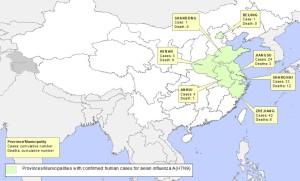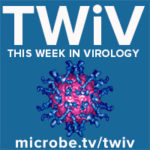 Hosts: Vincent Racaniello, Rich Condit, Alan Dove, and Kathy Spindler
Hosts: Vincent Racaniello, Rich Condit, Alan Dove, and Kathy Spindler
Vincent, Rich, Alan and Kathy review H7N9 infections in China, the debate over patenting genes, and receptor-binding by ferret-transmissible avian H5 influenza virus.
Click arrow to play
Download TWiV 230 (73 MB .mp3, 101 min)
Subscribe (free): iTunes, RSS, email
Links for this episode:
- Francois Jacob dies (The Loom)
- WHO updates on H7N9
- H7N9 is unusually dangerous (ScienceInsider)
- H7N9 case imported into Taiwan
- No H7N9 in poultry farms (Xinhua)
- Supreme Court considers gene patents (TheScientist, Nature)
- Patent my jeans, not my genes (Michael Wosnick)
- Receptor binding by ferret transmissible H5 virus (Nature)
- Microscale thermophoresis and bio-layer interferometry (Wikipedia)
- Letters read on TWiV 230
Weekly Science Picks
Alan – World Science Festival
Rich – 3 years of the sun in 3 minutes
Vincent – The Origin of AIDS by Jacques Pepin
Kathy – Wringing out a wet washcloth in space (YouTube)
Listener Pick of the Week
Mark – Will it blend? (iPhone app)
Marianne – Enjoy your Cells
Send your virology questions and comments (email or mp3 file) to twiv@microbe.tv


Dr. Henry Niman disagrees. At the Rhiza Labs FluTracker Forum he wrote:
“H7N9 is all about mammalian adaptation via SINGLE NUCLEOTIDE POLYMORPHISMS, especially those in and around the RECEPTOR BINDING DOMAIN.
The Q226L is common in H9 in H9N2. The acquisition of the H9N2 internal genes made Q226L viable in H7, so it is in most of the poultry sequences, as well as most of the human H7N9 sequences.
L226I is the HUMAN key change, which is in SEASONAL flu. When it appeared in Hangzhou/1 (a chef who was infected in Jiangsu, where he works) it signaled HUMAN adaptation (L226I is NOT in poultry, and neither is PB2 E627K). When it appeared in Jiangsu/1 and every position in H7, N9, and MP EXACTLY matched Hangzhou/1 it signaled HUMAN TO HUMAN CLONAL EXPANSION…”
“Cases going down????? H7N9 cases are EXPLODING in China, including the second case in Fujian province and the cluster in Shandong.
You really need to look at the map and see the distribution, not the REPORTED number of confirmed cases.”
“I listened to the H7N9 update on TWIV, which I assume is the source of your confusion. They think cases are in decline and the human cases come from chickens, so their listeners are VERY confused.”
Those comments are in the thread which begins at:
http://fluboard.rhizalabs.com/forum/viewtopic.php?f=5&t=9481&sid=063001f7c62483a39a903753f73ca86f
Anyone reading anything from Henry Niman should probably Google him to get a little perspective on his history of doomsaying. If he’s now criticizing us for sticking to confirmed cases and actual data, that’s fine with me.
That’s an ad hominem argument which ignores the virological data and reasoning Dr. Niman presented in the above quote. He is saying, to the best of my understanding, that there are several mammalian-adaptation polymorphisms in all of the human sequences which have been released so far which are not present in any of the poultry sequences, and that this indicates human-to-human transmission because it would be extremely unlikely for these identical changes to spontaneously develop in every human case if the humans had been infected by poultry. I was hoping that a virologist would comment.
It’s not an ad hominem, just an admonition to look at Niman’s track record. Furthermore, he’s not presenting data in the quote above, just screaming the conclusions he’s jumped to in ALL CAPS.
If someone were asking you to have faith in Dr. Niman, then it would be appropriate to refer to his record. But no one is asking you to believe the quotes because they came from him, so what you said is absolutely ad hominem, attacking not only him but his manner of expression as well (and ignoring that the caps related to the fact that he was addressing a specific person on a Web forum). Meanwhile, you still haven’t addressed the issue.
This M.D. did address the issue:
http://www.upmchealthsecurity.org/website/resources/perspectives/H7N9_05062013.html